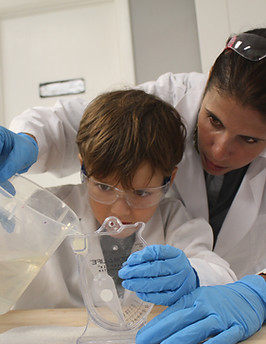
FIELD STUDY TRIPS
Hands-On Field Study
Experiments, Dissections, Nature Art, Finding Clues and more are just a few of the hands-on study sessions we can bring to your classroom. Our NP Squad bring microscopes, plants, animals, technology and much more to bring science to life. Teachers can choose from any of our study sessions to create the best experience to their science curriculum.
The In-House Field Study Package:
-
Location | Provided by the host
-
Duration | 1.5 hours
-
Price | $13 per participant
-
Age | 5 and up
-
Number of Participants | Over 12 Participants
-
Activity | Please select the "Field Trip Package" button to view all In-House Field Study Activities that we offer.

NP Science & Nature Based Experiential Learning Programs
Experiential learning is the process of learning through experience, and is more specifically defined as "learning through reflection on doing". Hands-on learning is a form of experiential learning but does not necessarily involve students reflecting on their product. Experiential learning is distinct from rote or didactic learning, in which the learner plays a comparatively passive role. It is related to, but not synonymous with, other forms of active learning such as action learning, adventure learning, free-choice learning, cooperative learning, service-learning, and situated learning.
Our Study Sessions are divided into four different approaches:
Abiotic Studies
Biotic Studies
Research and Technology Studies
Environmental Studies

In-House Field Trip:
Abiotic Studies
Abiotic factors are non-living chemical and physical parts of the environment that affect living organisms and the functioning of ecosystems. In biology and ecology, abiotic components or abiotic factors are non-living chemical and physical parts of the environment that affect living organisms and the functioning of ecosystems. Abiotic components include physical conditions and non-living resources that affect living organisms regarding growth, maintenance, and reproduction. Resources are substances or objects in the environment required by one organism and consumed or otherwise made unavailable by other organisms. During the Abiotic Studies Module, students will learn about all the non-living components necessary for life on Earth.
Cost:
3 hours/ 3 study sessions: $995
Full Day at School: $1295
Maximum of 25 students per group
Each hour can be divided into two sessions of 30 minutes to accommodate more participants

In-House Field Trip:
Biotic Studies
Biotic components are all the living things in an ecosystem. They are the animals, the plants and the microorganisms. Biotic components also include the waste from living things and dead organisms. Life is a characteristic distinguishing physical entities having biological processes, such as signaling and self-sustaining processes, from those that do not, either because such functions have ceased, or because they never had such functions and are classified as inanimate. Various forms of life exist, such as plants, animals, fungi, protists, archaea, and bacteria. Biology is the primary science concerned with the study of life, although many other sciences are involved. During the Biotic Studies Module our scientists will study life in all it’s forms, from plants to bacteria, to populations and systems.
Cost:
3 hours/ 3 study sessions: $995
Full Day at School: $1295
Maximum of 25 students per group
Each hour can be divided into two sessions of 30 minutes in order to accommodate more participants

In-House Field Trip:
Research & Technology Studies
The use of technology such as microscopes, compasses, dissecting tools, and more allows young scientists to gather information and understand concepts on a deeper level. Research comprises "creative work undertaken systematically to increase the stock of knowledge, including knowledge of humans, culture, and society, and the use of this stock of knowledge to devise new applications." It is used to establish or confirm facts, reaffirm the results of previous work, solve new or existing problems, support theorems, or develop new theories. The primary purposes of basic research are documentation, discovery, interpretation, or the research and development of methods and systems for advancing human knowledge.
Cost:
3 hours/ 3 study sessions: $995
Full Day at School: $1295
Maximum of 25 students per group
Each hour can be divided into two sessions of 30 minutes to accommodate more participants.

Outdoor Field Trip:
Environmental Studies
An ecosystem is a community of living organisms in conjunction with the nonliving components of their environment interacting as a system. An ecosystem is a community of living organisms in conjunction with the nonliving components of their environment (things like air, water and mineral soil), interacting as a system. These biotic and abiotic components are regarded as linked together through nutrient cycles and energy flows. As ecosystems are defined by the network of interactions among organisms, and between organisms and their environment, they can be of any size but usually encompass specific, limited spaces. Field Study Trips allows students to discover these dynamics and understand the importance of all elements as one. The Environmental Studies module will provide students with the opportunity of visiting different ecosystems.
Cost:
$1595 3 hours
Choose one of the options below:
One-Land Based Study Session and One-Water Based Study Session
or
Two Land-Based Study sessions
Maximum of 25 students per group
Ratios: 1:10 for land-based sessions, 1:6 water-based sessions
